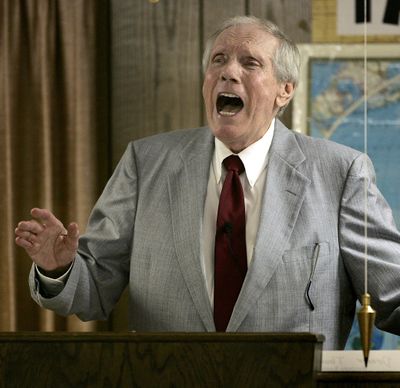Anti-gay preacher Fred Phelps dies

Fred Phelps, a publicity-hungry Kansas pastor who picketed hundreds of military funerals because he believed America was too sympathetic to gays, died late Wednesday in Topeka, Kan. He was 84.
His daughter, Margie Phelps, confirmed his death but did not give the cause.
With his small Topeka congregation, Phelps also demonstrated at funerals and memorials for Frank Sinatra, Michael Jackson, former Mormon leader Gordon B. Hinckley and heavy metal singer Ronnie James Dio – any observance, regardless of any connection to gay issues, where cameras might be rolling.
Convinced that the deaths of U.S. soldiers were divine retribution for the nation’s increasing acceptance of homosexuality, Phelps and his followers carried signs like: “Thank God for Dead Soldiers” and “God Hates the USA/Thank God for 9/11.” A disbarred attorney, Phelps and his Westboro Baptist Church were sued numerous times but won a landmark freedom of speech case in the U.S. Supreme Court.
Despite its name, his church is unaffiliated with any denomination. Its Web address, more reflective of its founder’s theology, contains an anti-gay slur. The congregation is heavily composed of his relatives, including many of his 13 children and 54 grandchildren.
Two of his estranged sons, Nate and Mark, have said that Phelps’ clan “excommunicated” him last year. The church declined to comment.
Phelps came to national attention in 1998 leading anti-gay pickets at the Casper, Wyo., funeral of Matthew Shepard, a gay 21-year-old who had been lashed to a fence post and beaten to death. Five years after the funeral, Phelps returned to Casper with plans to erect a granite monument inscribed: “Matthew Shepard Entered Hell Oct. 12, 1998.”
Phelps was denounced by many conservative Christian leaders, including the Rev. Jerry Falwell, who called him a “hatemonger” and “emotionally unbalanced.”
Phelps jubilantly acknowledged spreading the message of hate.
“He’s saying I preach hate? You can’t preach the Bible without preaching hate!” Phelps told the Los Angeles Times in 1999.
“Looky here, the hatred of God is an attribute of the Almighty,” he said. “It means he’s determined to punish the wicked for their sins!”
Phelps’ funeral protests were intensely contested in court. In 2006, Phelps and six of his followers picketed a funeral for Lance Cpl. Matthew Snyder, a Marine killed in Iraq. Considering the case in 2011, the U.S. Supreme Court ruled that such demonstrations, no matter how odious, were legal as long as protesters obeyed state and local laws setting a minimum distance between themselves and mourners.
In his dissenting opinion, Justice Samuel A. Alito Jr. wrote that the nation’s commitment to free speech is not a license for “vicious verbal assault.”